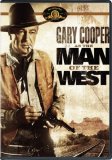| Reviews & Columns |
|
Reviews DVD TV on DVD Blu-ray 4K UHD International DVDs In Theaters Reviews by Studio Video Games Features Collector Series DVDs Easter Egg Database Interviews DVD Talk Radio Feature Articles Columns Anime Talk DVD Savant Horror DVDs The M.O.D. Squad Art House HD Talk Silent DVD
|
DVD Talk Forum |
|
|
| Resources |
|
DVD Price Search Customer Service #'s RCE Info Links |
|
Columns
|
|
|
Man of the West
MGM has released a disappointingly bare-bones edition of one of the best Westerns of the 1950s, Man of the West, directed by Anthony Mann and starring Gary Cooper. Not a hit when originally released in 1958, Man of the West's reputation has grown significantly over the years, with its influence seen in countless, later "adult" and "spaghetti" westerns. Brutal, vicious, and complex, with typically stunning, meaningful location work by Mann, Man of the West looks quite good here in its original CinemaScope ratio, but the lack of any extras - not even a trailer - is curious considering the film's overall standing in the Western oeuvre.
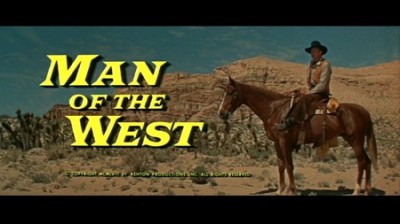
Cooper plays Link Jones, who's on his way to Fort Worth to hire a school teacher for his town, Good Hope. Riding the train to Fort Worth, he meets Sam Beasley (Arthur O'Connell), a jittery card shark who tries to pull a fast one on Link, telling him that saloon singer Billie Ellis (Julie London), who's also on the train, is a trained schoolteacher. But Link's wise to their con and quickly declines. Traveling through territory where notorious bank robbers like Dock Tobin and his gang used to ride, legend becomes fact when Tobin's gang tries to raid the train - with Link, Sam, and Billie left behind as the train makes a fast getaway. And unfortunately for Link, all the town's money for the schoolteacher - and his gun - were left on the train.
With the Billie and the ineffectual Sam looking to Link as their leader, and with the group a hundred miles from the nearest town, Link seeks shelter at a nearby farmhouse he knows about; a farmhouse where he grew up. Checking to see if anybody is still there, Link is forced at gunpoint to enter, where his uncle, Dock Tobin (Lee J. Cobb) still lives, with a new gang of cutthroats: Coaley (Jack Lord), who's Link's cousin; Ponch (Robert Wilke), and mute Trout (Royal Dano). Link's other cousin, Claude (John Dehner) is heading en route to the farmhouse. Ellie and Sam soon learn that Link was once a bloodthirsty outlaw, just like his uncle and his gang, and that their only chance of survival depends on Link's protection (he lies to Dock, telling him that he's come back on purpose to join the gang).
Almost immediately, Dock and the gang have intentions of raping Ellie, but Link manages to distract Dock, who calls off Coaley during Ellie's forced striptease before the assault goes any further. Dock, uncertain as to whether or not Link is really back (Dock evidently was deeply hurt when Link ran off as a young man), decides a bank robbery is the best way to prove Link's true intentions. But this plan will have a have a devastating effect on Dock, the gang, Link, and the innocents who are forced along for the ride.
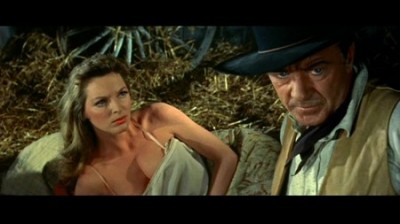
SPOILERS ALERT!
I've always wondered if Anthony Mann had signed Jimmy Stewart to play in Man of the West, if it wouldn't have achieved a greater critical and box office success than with Gary Cooper. Certainly Cooper by 1958 had entered the realm of bona fide film icon with audiences, but his films weren't achieving the level of critical or box office success they had had before, while Stewart's career was stronger at this point, and his past association with Mann in a successful series of westerns would most probably have created more buzz for Man of the West. But Cooper proved to be an inspired choice precisely because he hadn't become largely associated with dark, psychologically complex and layered characters as had Stewart - an audience association fueled by his turns in earlier Mann westerns, as well as his series of pictures with Alfred Hitchcock. Cooper to many audience members was still Sergeant York, still Longfellow Deeds or Marshal Will Kane, something that I think Mann knew very well and which he played off Coop to great effect (watch how Cooper does his standard "aw shucks" thesping at the beginning of Man of the West - with subtle asides to let us know it's all a dodge). To have Cooper's Link turn out to be a former bank robber, a ruthless killer (and by implication, a rapist, as well), must have been a shock to audiences, regardless of whether or not those actions happened before the film's story takes place. Perhaps it was this disconnect between Coop's image and his character that caused uneasiness with ticket buyers and critics.
There's a hard-edge, crystalline brilliance to Man of the West that comes from a wholly informed melding of Mann's visual poetry, the verve and precision of his direction (I think the choreography in his action scenes are without equal), and the deceptive simplicity of Reginald Rose's screenplay. Of course there's an epic, iconic visual quality to Man of the West that many critics comment on, perhaps best exemplified by the opening title sequence that has Gary Cooper riding up to his own title card (it's a startling, self-reflexive opening, which demands the audience view Coop as something akin to a monument - a perception that Mann will then proceed to undermine). And typical of Mann's westerns, the locales feel as important as the characters (the Lassoo ghost town is shot to look both shimmering and desolate).
However, that epic quality seems secondary to the tight, grim, almost noir feel that Mann creates, not unlike his earlier crime melodramas that are models of the genre. Mann's and Rose's central premise in Man of the West is the gradual return to savagery that Link must embrace if he, ironically, wants to remain civilized and save his charges, Ellie and Sam. Setting the opening scenes in a frontier town, and moving further and further away from civilization (town to railroad station to railroad tracks to abandoned farm house to abandoned ghost town), the farther Link moves away from his civilizing influence (it's no coincidence his home town is called Good Hope), the more violent and vicious he must become. And that change terrifies and sickens him. With a sense of dread and foreboding when he comes upon his boyhood farmhouse where he learned to kill and rob at the hands of Uncle Dock, Billie asks if he was young boy when he lived there, to which Link replies: "I don't know what I was." And after Link barely manages to avert Billie's gang rape by Dock's gang, back in the barn she rejects the idea that Link could have grown up with a man like Dock, and that he could ever have done the things they do - to which Link emphatically states he was exactly like them. It's a creepy moment to hear the legendary Coop play a character who willingly admits to past robberies, murders and rapes. And what drives Link to the brink of killing is the shame he feels for being thought a murderer and robber again; when he finds out that everyone in the territory is now looking for him (he's identified by a deputy who saw him get on the train), he understands that he'll have to go through all the suspicion and fear from his fellow townspeople again - if they'll even have him back.
Ellie's forced stripping is probably the scene most viewers remember from the film, which is certainly problematic for the viewer because it is shot to titillate, even though there's nothing remotely erotic about it, nor is there anything remotely sympathetic in the debased, slavering villains who demand it. In a rather tame way, it reminds me how viewers feel during Peckinpah's similarly ambivalent rape scene in Straw Dogs, where he literally invites the viewer to enjoy the rape, until he pulls the rug out from under them to show how despicable it is. And the same holds true for this scene. Mann has the gorgeous London strip, slowly, and let's the camera catch it all, before he shows her collapsing in humiliation and disgust not once, but twice (again after Dock visits the barn where we assume he wants his share of Ellie off of Link).
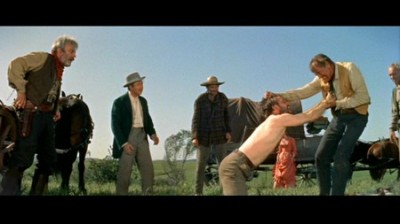
And to further embarrass the male audience members who may have been powerless not to admire the gorgeous London in various stages of undress, Mann stages a metaphorical rape of Coaley by Link, when the two fight to the death out on the range. Link, growing more confident in his ability to control the circumstances of his predicament, goads the vicious, cunning Coaley into a fight, not only beating him but going further in stripping Coaley of his clothes. One is taken aback as to what exactly Link means when he calls out, "Now I'm going to undress you, Coaley!" but it soon becomes apparent that he means to put Coaley through the same experience Coaley subjected Ellie to, and it's a devastating humiliation. Coaley, on the ground, half naked and crying, sputters that nobody makes fun of him - until Dock plugs him. It's an amazing, problematic sequence for those who enjoyed seeing London undress.
Mann's final sequence - the shootout at abandoned stagecoach stop Lassoo - is a brilliantly executed action scene (and one that Sergio Leone no doubt watched many times prior to embarking on his own series of spaghetti westerns). Lassoo, the abandoned town that symbolizes so many elements of the film's characters (it's a metaphor for the utter negation and emptiness of Dock's way of life, as well as a clear indication of his past-it skills - he didn't even know the town had went belly-up years before, as well as symbolizing the final level of hell that Link must travel to, to save himself and Ellie), shimmers like bleached bones in the sun, and Mann's camera tracks all over it, letting the locale overwhelm his characters in each frame. Objects or body parts in the foreground dominate one side of the expansive CinemaScope frame, while action goes on in the background - a dynamic visual hook that Leone made his own in the Eastwood Dollar films). Mann, whose choreography and geography within the battle scenes is startlingly clear, creates a set piece that stands with the very best examples of the showdown in the western genre (and how ironic it all is - particularly in reference to Coop's other iconic shootout in High Noon - when Mann subverts all our expectations as to how and where the gunplay is designed). Link's conversion to cold-blooded killer is complete when he seeks death for Dock who raped Ellie despite a promise not to, while Dock's death wish (to the accompaniment of Link calling out Dock's useless savagery in these changed, civilized times) achieves no poetry, not largeness, and not a shred of regret. He dies in the dirt and scrub where he belongs.
Not everything works in Man of the West. There is some fuzziness at the beginning of the film, when we wonder if Link really is all that naive (Coop does indulge in some of his favorite - and obvious - gorping around as he blinks naively at that newfangled train), until we finally guess that it must be a permanent dodge he assumes when he doesn't want people to connect the new reformed Link with the cold-blooded old Link. Potentially worse (and a drag on the picture that unfortunately doesn't go away with repeat viewings) is the serious miscasting of Lee J. Cobb in the pivotal role of Dock Tobin. Cobb, not nearly old enough to be the uncle that raised Link as a boy (Cobb was ten years younger than the 57-year-old Cooper - who looks considerably older than that), hams it up something terrible in Man of the West, which isn't exactly uncharacteristic of the outsized, broad film thesping of this stage-trained actor. Cobb's overacting can be amusing in films, but here, it's a wrong note in an otherwise perfect western. One only wishes someone else could have been cast in the role.
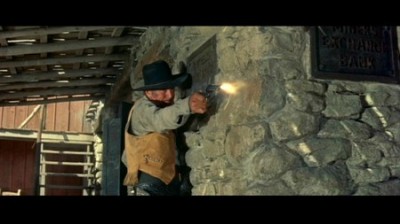
The DVDs:
The Video:
The anamorphically enhanced, 2.35:1 widescreen video transfer for Man of the West looks agreeably clear and strong, although grain and a few minor blemishes do pop up here and there. There are no compression issues I could spot, and playback on a big monitor is a most satisfying experience, to say the least; if any kind of a film needs to be seen on as big a monitor as possible, it's a western - particularly one as visually impressive as Man of the West.
The Audio:
Unfortunately, the Dolby Digital English mono mix (undoubtedly the way the film was originally presented in theatres) is quite tame; what a pity we can't here those booming flashes of gunfire in a stereo mix. French and Spanish mono mixes are also available, as well as English, and Spanish subtitles. Close-captioning is also available.
The Extras:
Inconceivably, there are no extras for Man of the West. One of the most important American westerns ever made, and not even a measly trailer included. Shame on MGM.
Final Thoughts:
Brutal, raw, deceptively simple but in reality powerfully layered and complex, Man of the West is flat-out one of the best American westerns ever made. Period. Gary Cooper gives one of his finest, most surprising performances, and director Anthony Mann draws up the blueprint for all future "adult" westerns. It's still a hammer-blow experience, fifty years later. The movie itself is highly recommended, but shame on MGM for dumping this classic in a plainwrap edition.
Paul Mavis is an internationally published film and television historian, a member of the Online Film Critics Society, and the author of The Espionage Filmography.


|
| Popular Reviews |
| Sponsored Links |
|
|
| Sponsored Links |
|
|
| Release List | Reviews | Shop | Newsletter | Forum | DVD Giveaways | Blu-Ray | Advertise |
|
Copyright 2024 DVDTalk.com All Rights Reserved. Legal Info, Privacy Policy, Terms of Use,
Manage Preferences,
Your Privacy Choices | |||||||









